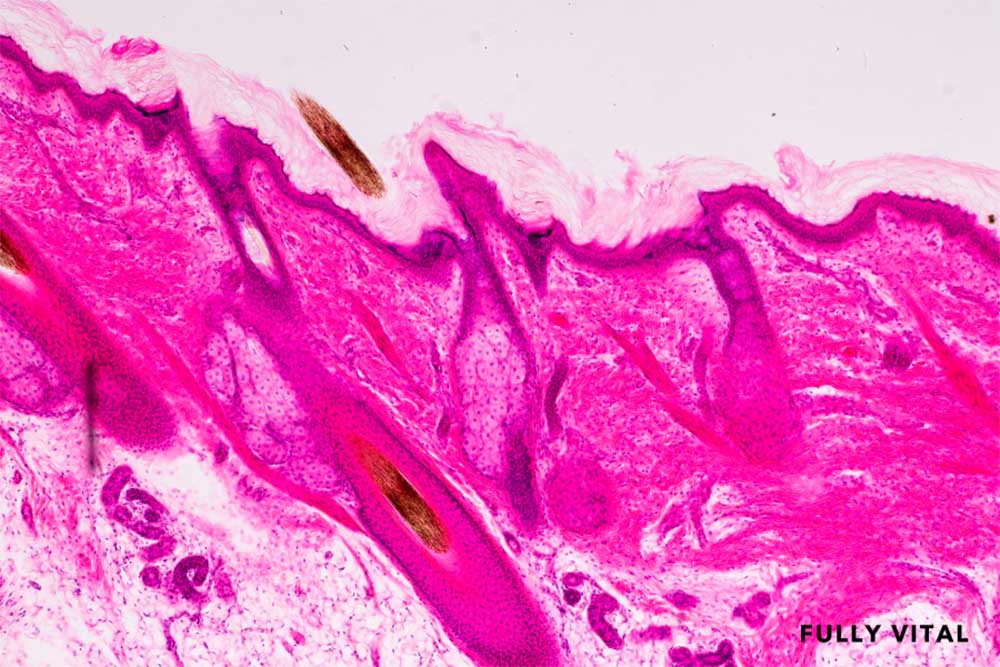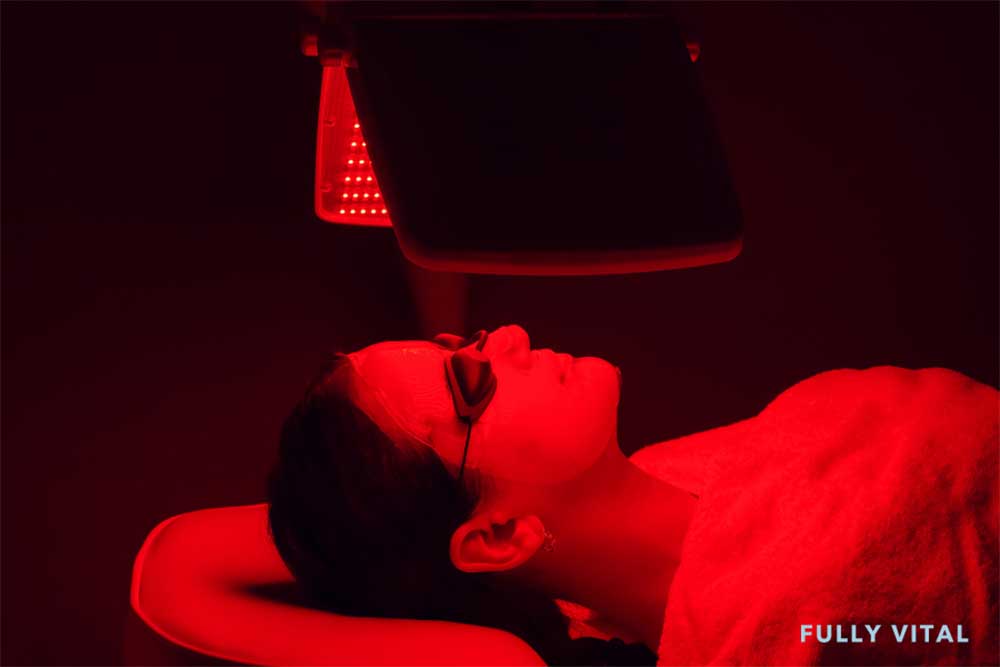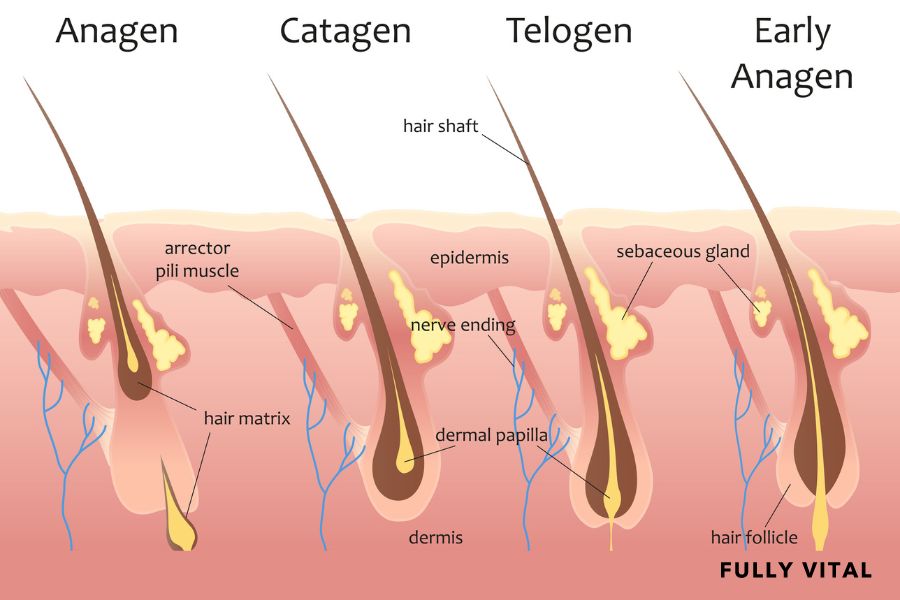
Scalp Biopsy: Understanding tScalp Biopsy: Understanding the Importance and Alternativeshe Importance and Alternatives
Welcome to our comprehensive guide on scalp biopsy, an essential topic for women of all hair types who are seeking ways to stimulate hair growth.
In this article, we'll dive into the intricacies of scalp biopsy, its significance, how it works, benefits, potential downsides, and alternative options.
Our aim is to provide you with an informative and conversational piece that addresses all your queries about scalp biopsy.

I LOVE MY HAIR NOW
FullyVital hair serum and hair vitamins made tremendous improvements in my hair. I truly love my hair now.
Dorit S.,
What Is Scalp Biopsy?2
A scalp biopsy is a medical procedure that involves the removal of a small sample of skin and underlying tissue from the scalp.
This sample is then examined under a microscope to gather crucial insights into various scalp conditions and diseases that might be affecting hair growth.
Why Is Scalp Biopsy Important?
The importance of scalp biopsy lies in its ability to provide accurate and detailed information about the health of your scalp and hair follicles.
By analyzing the biopsy sample, medical professionals can pinpoint the underlying causes of hair thinning, hair loss, or other scalp-related concerns.
This diagnostic technique aids in devising targeted and effective treatment plans.
How Does Scalp Biopsy Work?
The process of scalp biopsy involves the following steps:
-
Preparation: A small area of the scalp is cleaned and numbed using a local anesthetic.
-
Sample Collection: A dermatologist extracts a sample using a biopsy punch tool or a scalpel.
-
Stitching: If stitches are required, they are usually small and dissolve over time.
-
Lab Analysis: The collected sample is sent to a laboratory for microscopic examination by pathologists.

What Are The Benefits Of Scalp Biopsy?
Opting for a scalp biopsy offers several benefits:
Accurate Diagnosis
It provides precise information about scalp conditions, guiding proper diagnosis.
Tailored Treatment
Results help in developing personalized and effective treatment strategies.
Understanding Underlying Issues
Scalp biopsy reveals the root causes of hair problems.1
Are There Any Downsides To Scalp Biopsy?
While scalp biopsy is generally safe, there are a few potential downsides to consider:
-
Discomfort: Mild discomfort during the procedure and while the scalp heals.
-
Risk of Infection: A slight risk of infection at the biopsy site.
-
Scar Formation: Possibility of a small scar at the biopsy area.
What Are The Alternatives To Scalp Biopsy?
If you're not ready for a scalp biopsy, there are alternative options to explore:
-
Trichoscopy: Non-invasive technique using a specialized microscope to examine the scalp.
-
Blood Tests: Certain blood tests can provide insights into underlying issues affecting hair.
-
Clinical Evaluation: Dermatologists can diagnose some conditions through a thorough examination.
Should I Do A Scalp Biopsy?
If you're considering a scalp biopsy, it's important to weigh the pros and cons based on your specific situation.
Here are some factors to consider:
Medical Guidance
Consult a dermatologist or a medical professional to determine if a biopsy is necessary.
Unresolved Concerns
If you're experiencing persistent hair loss or unusual scalp symptoms, a biopsy might provide valuable insights.
Informed Decision
Understanding the procedure and its implications will help you make an informed choice.
What Does A Scalp Biopsy Test For?
A scalp biopsy is a diagnostic tool that can test for a range of conditions affecting the scalp and hair follicles, including:
-
Alopecia: Different types of hair loss conditions, such as alopecia areata or androgenetic alopecia.
-
Infections: Scalp infections caused by fungi, bacteria, or viruses.
-
Inflammatory Disorders: Conditions like scalp psoriasis or lichen planopilaris.
-
Cicatricial Alopecia: Scarring hair loss conditions that lead to permanent hair follicle damage.
Can A Scalp Biopsy Diagnose Hair Loss?
Yes, a scalp biopsy can play a crucial role in diagnosing the underlying causes of hair loss.
By analyzing the tissue sample, dermatologists can identify specific conditions or factors contributing to hair thinning or loss.
This information is vital for creating an effective treatment plan tailored to your needs.
Will Hair Grow Back After A Scalp Biopsy?
Absolutely, in most cases, hair will grow back after a scalp biopsy.
The procedure targets a small area, and the surrounding hair follicles remain unaffected.
As the biopsy site heals, you can expect regrowth within a few weeks to a couple of months.
Following proper aftercare instructions will support healthy regrowth.2
How Do You Shower After A Scalp Biopsy?
After a scalp biopsy, follow these showering guidelines to ensure proper healing:
-
Wait for Healing: Avoid washing your hair for at least 24 to 48 hours after the procedure.
-
Gentle Cleansing: Use a mild, sulfate-free shampoo and lukewarm water.
-
Avoid Scrubbing: Gently apply shampoo without scrubbing the biopsy area.
-
Pat Dry: After rinsing, gently pat your scalp dry with a soft towel.
-
Avoid Irritation: Refrain from using harsh products or exposing the area to excessive heat.
Remember, proper aftercare promotes healing and minimizes the risk of complications.
What Is The History of Scalp Biopsy?
The history of scalp biopsy is a testament to medical advancements and the pursuit of better hair health:
-
Early Beginnings: Scalp biopsies gained traction in the mid-20th century as a means to diagnose alopecia and scalp disorders.
-
Diagnostic Evolution: Over time, the procedure's accuracy improved, leading to better identification of hair loss causes.
-
Research Contributions: Scalp biopsy research contributed to our understanding of conditions like androgenetic alopecia and cicatricial alopecia.
What Is The Current Diagnostic Landscape Of Scalp Biopsy?
In today's landscape, scalp biopsy continues to play a vital role in hair health assessments:
-
Precise Diagnosis: Scalp biopsies offer unparalleled insights into the specific causes of hair issues, enabling targeted treatments.3
-
Personalized Solutions: Dermatologists use biopsy results to recommend tailored interventions, enhancing efficacy.
-
Scientific Integration: Biopsy findings contribute to ongoing research, shaping our understanding of hair-related conditions.
Our Best Sellers
What Is The Future of Scalp Biopsy?
Looking ahead, the future of scalp biopsy holds promise for both diagnosis and treatment:
-
Advanced Techniques: Ongoing technological advancements may lead to less invasive, yet equally informative, biopsy methods.
-
Therapeutic Breakthroughs: Insights from biopsies could pave the way for innovative hair growth products tailored to individual needs.
-
Early Intervention: Scalp biopsies might enable early detection of hair health issues, facilitating proactive measures.

Unlock the Potential of Your Hair with Fully Vital!Discover the secret to maintaining a vibrant and resilient relationship with your locks through Fully Vital's cutting-edge hair growth products. Our mission revolves around empowering you to embrace the journey of healthier, more youthful hair. Here's how we do it:
Experience the transformational benefits of Fully Vital's hair growth products and rediscover the joy of strong, lustrous hair that reflects your inner vitality. Your hair has a story to tell – let us help you make it a story of timeless beauty. |
Final Thoughts On Scalp Biopsy
Exploring the realm of scalp biopsy has illuminated the path to understanding the intricate interplay between your scalp, hair follicles, and overall hair health.
By delving into the procedure's significance, benefits, and future potential, you've gained valuable insights into the world of diagnostic techniques that cater to your individual hair care needs.
As you embark on your journey towards healthier and more vibrant hair, remember that knowledge is your greatest ally.
Armed with information about the history, current landscape, and future prospects of scalp biopsy, you're better equipped to make informed decisions about your hair health.
At Fully Vital, we recognize the importance of nurturing your locks and preserving their vitality.
Our range of hair growth products is designed to combat the signs of aging, helping you forge a more resilient and beautiful relationship with your hair.
Embrace the power of informed choices and explore the potential for a healthier, more radiant you.
Keep your curiosity alive, stay informed, and continue to cherish the health of your hair.
After all, every strand tells a story, and with the right care, your story can be one of strength, vibrancy, and enduring beauty.
Frequently Asked Questions About Scalp Biopsy
Can I style my hair as usual after the biopsy?
It's recommended to avoid styling products and heat for a few days.
Is scalp biopsy painful?
The procedure involves local anesthesia, so any discomfort is minimal.
How long does it take to recover after a scalp biopsy?
Recovery usually takes a week, and any stitches will dissolve on their own.
Will a scalp biopsy diagnose hair texture changes?
Yes, a scalp biopsy can help identify the causes of hair texture changes.
Is scalp biopsy suitable for all hair types?
Yes, scalp biopsy can provide valuable information for all hair types.
Can a scalp biopsy detect scalp infections?
Yes, infections can often be identified through biopsy analysis.
Can I drive home after a scalp biopsy?
It's generally safe to drive yourself home after a scalp biopsy.
The procedure typically involves local anesthesia, which doesn't impair your ability to drive.
uHowever, if you feel any discomfort or dizziness, it's advisable to arrange for someone to drive you.
Will my scalp be visibly different after the biopsy?
In most cases, the visible difference after a scalp biopsy is minimal.
If stitches are used, they are usually small and dissolve over time.
Any scarring or changes in appearance are typically very subtle and fade as the area heals.
When can I resume my regular hair care routine?
You can gradually resume your regular hair care routine after the biopsy area has healed, usually within a week or two.
However, continue to be gentle and avoid excessive heat, tight hairstyles, or harsh products during the healing process.
Can I undergo multiple scalp biopsies if needed?
Yes, if necessary, you can undergo multiple scalp biopsies.
However, consult your dermatologist to ensure the safety and appropriate timing of subsequent procedures.
Sources:
-
Al-refu, K. (2013). Scalp Biopsy and Diagnosis of Common Hair Loss Problems. In www.intechopen.com. IntechOpen. https://www.intechopen.com/chapters/45135
-
Dhurat, R., & Saraogi, P. (2009). Hair evaluation methods: Merits and demerits. International Journal of Trichology, 1(2), 108. https://doi.org/10.4103/0974-7753.58553
-
Wadstein, J., Thom, E., & Gadzhigoroeva, A. (2020). Integral Roles of Specific Proteoglycans in Hair Growth and Hair Loss: Mechanisms behind the Bioactivity of Proteoglycan Replacement Therapy with Nourkrin® with Marilex® in Pattern Hair Loss and Telogen Effluvium. Dermatology Research and Practice, 2020, 1–17. https://doi.org/10.1155/2020/8125081







